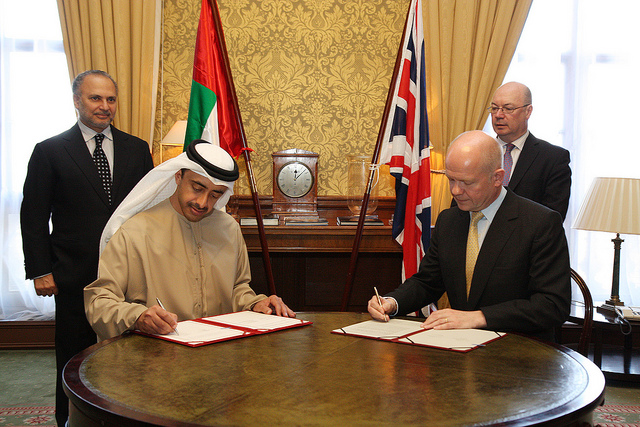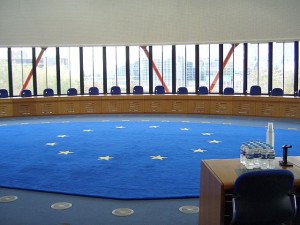The UK is inconsistent in its support for human rights and democracy overseas
In the 2012 audit of UK democracy, Stuart Wilks-Heeg, Andrew Blick, and Stephen Crone discussed the role of the UK in promoting democracy and human rights overseas. They found the UK purports to set itself high standards in this area, and has made progress recently by agreeing new international human rights instruments. Our relationship with the European Convention on Human Rights suggest a desire to weaken international standards, however, and our support for human rights is also conditioned by political and commercial concerns.

Foreign Secretary William Hague meets His Highness Sheikh Abdullah bin Zayed Al Nahyan of the United Arab Emirates. Credit: Foreign and Commonwealth Office (CC BY-ND 2.0)
The UK government is officially committed to the active pursuance of human rights and democracy internationally. The Labour government, first elected in 1997, was committed to an ‘ethical dimension’ to foreign policy. An innovation introduced by this government was the publication of annual international human rights monitoring reports. The coalition has continued to produce these documents, slightly retitled as human rights and democracy reports. The coalition also has an official commitment to human rights. The Foreign Office first adopted in 2010 a ‘Business Plan’ comprising of five ‘structural reform priorities’. The commitment to human rights was part of item five on the list. It was, however, not an item in its own right. Moreover, in this item, human rights were presented as being a subset of ‘British values’, arguably a curious categorization given that the UK is committed to human rights under international conventions, and as universal values.
During the period covered by this Audit, the Export Control Act 2002 was newly introduced. It supplanted a practice whereby the government had used regulations intended to prevent trading with the enemy during war. This earlier approach was judged legally questionable. The new act determined that export controls could be introduced ‘for the purpose of giving effect to any [European] Community provision or other international obligation of the United Kingdom’; and a range of other ends such as the national security of the UK and allies of the UK; or generally in the interests of stability worldwide. The products that could be controlled included those whose export might bring about ‘breaches of international law and human rights’. The Act provided for the issuing of orders which came into force at once, but had to be approved expressly in both Houses of Parliament. The Act required the government to produce annual reports to parliament on its operation. In the House of Commons, the Select Committees for Business, Innovation and Skills; Defence; Foreign Affairs; and International Development, collaborate to examine the government’s strategic export control system and policies. This arrangement is known as the ‘Committees on Arms Export Controls’ or ‘Arms Control Committee’.
The UK applies a set of criteria governing export controls that are based on a combination of national standards and the EU Code of Conduct on Arms Exports. While due concern is attached to human rights and related democratic issues, the provisos about commercial concerns, the industrial base of the UK and international relations could be seen as creating an inbuilt tension within the operation of the rules themselves. It is unclear which of these motives takes precedence when difficult decisions must be made.
UK policy and practice regarding international human rights and democracy
The attitude of the UK towards participation in international human rights instruments has been challenged. In 2004 the UK government concluded a review of its international human rights commitments. It chose to accept the optional protocol to the UN Convention for the Elimination of all forms of Discrimination Against Women for a trial period. But no other changes were made. In 2005 the parliamentary Joint Committee on Human Rights (JCHR) criticised the government for failing sufficiently to explain its reasons for not opting into more agreements at this stage. The JCHR called into question the reluctance of the government to accept individual rights of petition under human rights instruments; and its rejection of protocol 12 of the European Convention on Human Rights (ECHR), which would provide a free-standing protection against discrimination (see section 1.1.2 of this Audit). The committee called for further consideration of ratifying protocol four of the ECHR, which would strengthen freedom of movement. It found fault with UK reservations regarding international agreements on the rights of children, entered for the purposes of retaining discretion in immigration and asylum policy (see section 1.1.6). The JCHR did however welcome a number of recent ratification decisions. The UK had accepted protocol 13 of the ECHR, completely abolishing the death penalty; the optional protocol to the Convention Against Torture, allowing independent inspection of detention premises; agreements to prevent the exploitation of children; and protocol 14 of the ECHR, providing for better functioning of the European Court of Human Rights.
During the present Audit cycle, the UK has also sought through legal action to reduce the impact of the ECHR. It has intervened in cases before the European Court of Human Rights, in particular with a view to allowing it to deport terrorist suspects to potentially dangerous destinations, and to continue to impose a blanket ban on prisoner voting rights (see section 1.1.1). In both cases, were it successful, the UK would have an impact upon rights throughout the states to which the ECHR applied. In early 2012, the UK is seeking through its presidency of the council of Europe to reduce individual access to the European Court of Human Rights, linked to a domestic agenda of reviewing human rights provision (see section 1.1.3).
Whatever the formal international obligations and objectives of the UK regarding the associated causes of human rights and democracy, concerns have long been raised about the extent to which they are consistently fulfilled in practice, as they have often seemed to be undermined by the desire to pursue commercial and strategic alliances. In its review of the 2008 Foreign Office annual human rights report, the House of Commons Foreign Affairs Committee observed a number of problems with UK policy towards human rights internationally. For example, the committee noted ‘that there remains little evidence that the British Government’s policy of constructive dialogue with China has led to any significant improvements in the human rights situation’. Furthermore, enormous violations of democratic principles continued in Saudi Arabia, yet the human rights report tended to downplay this problem. The committee warned that ‘[t]he fact that Saudi Arabia is a strategic ally of the UK should not lead to an official policy of turning a blind eye to its human rights failings’. In 2011 the same committee pressed the government on its reluctance to support the establishment of an international panel to investigate alleged atrocities during the Sri Lankan civil war. A longstanding criticism of the UK has been its tendency in various ways to support – or fail to criticise – Israel for its questionable activities during the ongoing Middle East conflict. For instance, in 2006 Israel launched attacks against Lebanon, but the UK (along with the US) would not call for an immediate. The UK alliance with the US, and its implications for the international rule of law, including the prohibition of torture, is considered in more detail below (see section 2.4.2). One feature of this relationship has manifested itself in extradition policy. Under the US-UK Extradition Treaty of 2003 the UK must provide the US with reasonable evidence that they are seeking the correct person; while the US need not meet such a requirement.
There is evidence of special privileges apparently being accorded to the arms manufacturing sector in the UK and that their export activities are not as tightly controlled as they should be, to the detriment of human rights internationally (see section 2.6.4). The House of Commons Arms Control Committee has expressed the view that: ‘the Government should take a longer term view about unstable countries, and further appraisal is required where the peace is fragile. UK arms exports have ended up in places that were contrary to UK policy’. As a result of the violent response to uprisings in the Middle East and North Africa in 2011, the committee has observed that there was a frenetic change in government export control policy. This outcome suggested that the previous approaches adopted by successive governments had in some way been far from ideal. However, despite the repeated recommendations of the committee for the government to make its legal controls over extraterritorial arms deals – involving UK firms selling arms from one foreign country to another – more extensive, the intention of the present coalition government to enhance the sale of arms overseas raises particular concerns. On a more practical note, the committee has also complained about the inadequate delays in receiving timely information from the government in order to fulfil its scrutiny role.
During the period under examination, some progress was made in the area of arms control. Cluster munitions, if they do not detonate immediately, can become similar to unexploded landmines, posing a great threat to civilians. In 2007, after substantial pressure within parliament and from civil society groups, the UK government signed up to the Oslo Declaration, which required states to produce a binding treaty to prevent the ‘use, production, transfer and stockpiling of cluster munitions’. However, there were some concerns voiced about the precise way in which the government interpreted and implemented this agreement, and whether it left unsatisfactory loopholes. In 2008 the UK signed the Convention on Cluster Munitions, which came into force in 2010.
The Export Credits Guarantee Department (ECGD) plays an important official role in supporting UK trade policy, providing insurance and guarantees for UK manufacturers. For some time concerns have existed about its work in countries which have poor records on human rights. It has also been found to be subject to unsatisfactorily slight forms of democratic oversight. In 2009, the JCHR investigated the relationship between the private sector and human rights, both within the UK and internationally. It raised specific concerns about the ECGD. The committee held that there was not sufficient due diligence involved when the impact of companies seeking ECGD support on human rights was considered. Furthermore, ECGD decision-making processes were found not to be sufficiently transparent. In the same report, the JCHR identified wider failings by government to take clear measures to ensure that the commercial sector operated with sufficient regard to human rights concerns in its international operations. This issue is of particular concern given that it has been argued that under international law, states can have responsibility for the commercial activities of their nationals abroad and for the outcome of the subsidies that states provide.
This post is based is based on extracts from the 2012 audit of UK democracy. For further discussion see section 4.2.1 Support for human rights overseas. Please see our comments policy before posting. Shortlink: https://wp.me/p3F3ol-o9
Stuart Wilks-Heeg, Andrew Blick, and Stephen Crone are the authors of the 2012 Democratic Audit report.
Inset image Djtm (CC BY-SA 3.0)






 Democratic Audit's core funding is provided by the Joseph Rowntree Charitable Trust. Additional funding is provided by the London School of Economics.
Democratic Audit's core funding is provided by the Joseph Rowntree Charitable Trust. Additional funding is provided by the London School of Economics.